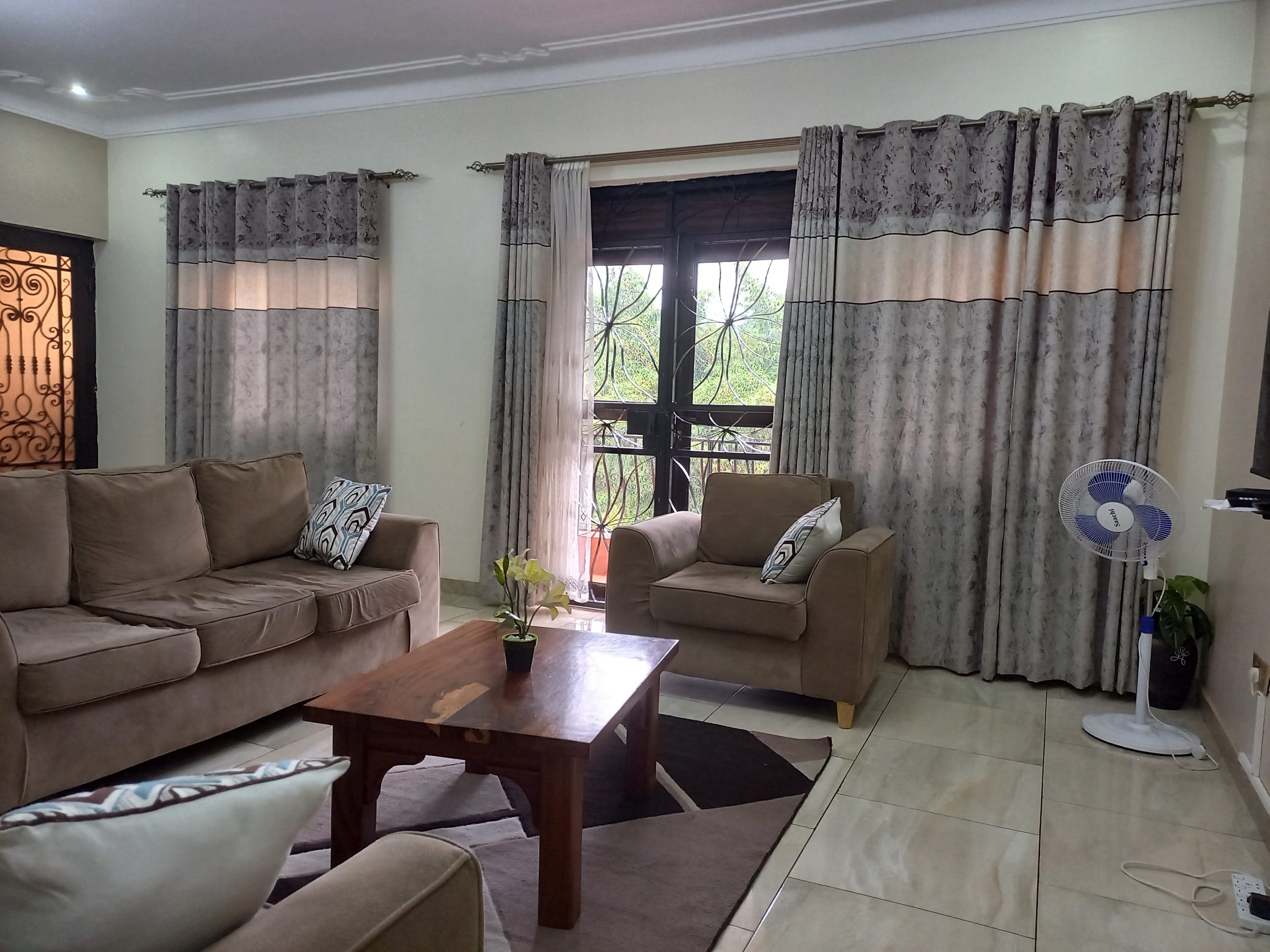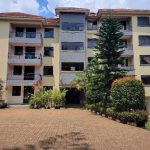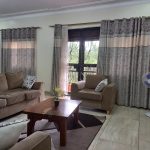Family Airbnb in Makindye: Your Complete Kampala Stay Guide
You’ve been planning this East African adventure for months. The gorilla permits are booked, the safari lodge confirmed, and now you need a comfortable Kampala base for those transition days—arriving jet-lagged with cranky children, recovering between intense travel legs, or exploring the capital before heading home. Maybe you’re visiting family stationed in Uganda and need your own space nearby. Perhaps you’re testing out Kampala for a potential longer relocation and want to experience neighborhood life authentically before committing.
Whatever brings your family to Kampala, you need more than generic hotel rooms. You need space where children can spread out after long flights, kitchens for preparing familiar foods when little stomachs rebel against adventure, and the kind of home-like environment that helps everyone adjust to new time zones and overwhelming sensory experiences. Makindye offers families booking short-stay accommodation exactly this combination—residential calm within reach of Kampala’s attractions, genuine Ugandan neighborhood character, and the practical amenities that transform good family trips into great ones.
This guide walks you through everything families need to know about booking Airbnb-style accommodation in Makindye, from choosing the right neighborhood within this sprawling area to understanding what amenities actually matter when traveling with children in Uganda.
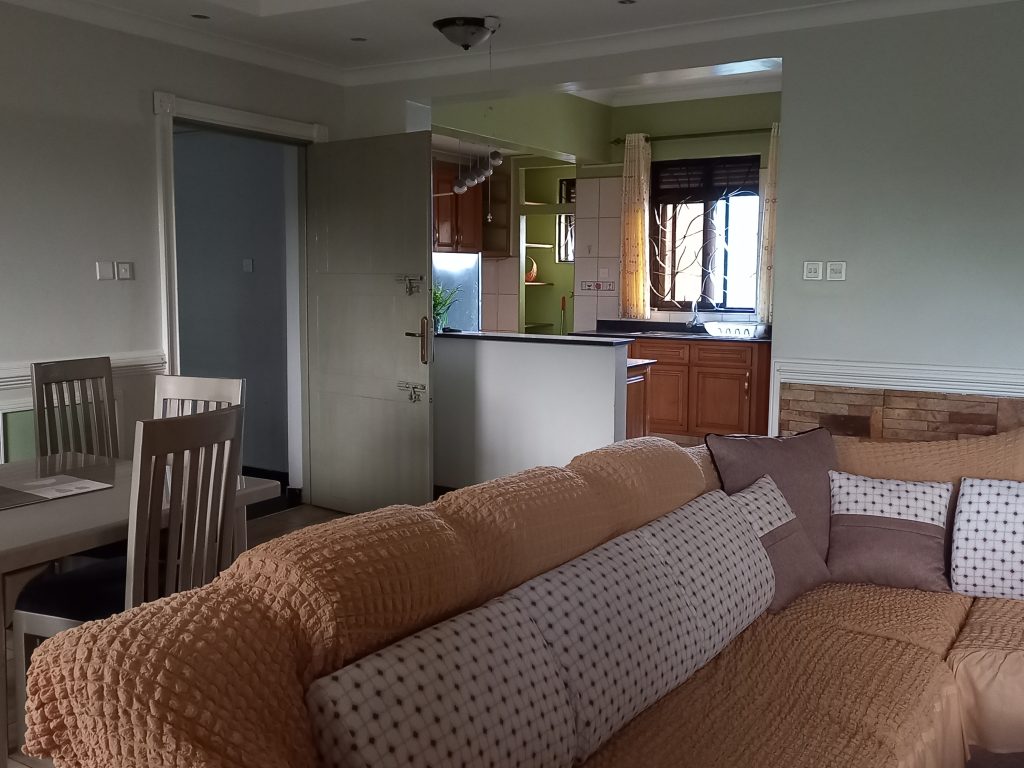
Why Families Love Makindye for Short Stays in Kampala
Makindye strikes a balance many Kampala neighborhoods miss—close enough to access city attractions without subjecting your family to constant urban intensity. When you’re managing jet-lagged toddlers, coordinating teenagers with different interests, or simply need a quiet place to regroup between safari adventures, this residential area provides breathing room that downtown hotels cannot match.
The neighborhood sprawls across gentle hills roughly 5-7 kilometers south of Kampala’s city center, with Ggaba Road serving as the main connection. You’re looking at 20-25 minutes to central attractions during reasonable traffic, putting Uganda Museum, craft markets, and cultural sites within easy reach while maintaining the kind of residential quiet that helps children actually sleep at night.
Compared to staying in Kampala Central where street noise penetrates even high-floor hotel rooms until 2am, Makindye’s residential streets let tired families rest properly. Unlike Kololo’s steep hills that turn simple walks into mountaineering challenges with strollers, much of Makindye offers flatter, more navigable terrain. And while Ntinda or Najjera provide excellent residential character, they sit much farther from Kampala’s attractions, adding 45+ minutes to every city outing with restless children in traffic.
The area attracts a healthy mix of Ugandan middle-class families, long-term expats, and short-term visitors, creating a welcoming environment where your family won’t feel like obvious tourists attracting constant attention. Children playing in compounds and walking to local shops is normal here—your kids become part of the neighborhood fabric rather than curiosities.
Lake Victoria access sits just 15-20 minutes south toward Ggaba and Munyonyo, providing easy beach days, boat rides, and waterfront dining that break up urban exploration. Entebbe’s zoo, botanical gardens, and more developed lakefront lie 45-60 minutes away—manageable day trips without marathon drives.
Understanding Makindye’s Different Sub-Areas for Family Stays
Makindye isn’t monolithic—this large neighborhood contains distinct sub-areas with different characters, advantages, and considerations for families booking short-stay accommodation.
Central Makindye (along Ggaba Road) offers maximum convenience—supermarkets, restaurants, pharmacies, and transport access literally steps away. Properties here work brilliantly for families prioritizing easy logistics over absolute quiet. The trade-off is more traffic noise and busier surroundings. Children comfortable with urban environments adapt easily, while families with light-sleeping babies might prefer quieter options.
Tank Hill and Kibuli areas sit slightly elevated off Ggaba Road’s main corridor, providing residential calm while remaining close to amenities. These areas attract many diplomatic and NGO families long-term, creating a stable, secure environment. Compounds here typically feature proper gardens, some even include small playgrounds. The gentle elevation offers better drainage during rainy season—important when you’re navigating with children and luggage.
Salaama Road neighborhoods extend further from Ggaba Road into genuinely quiet residential territory. Properties here feel more authentically Ugandan—less expat bubble, more local community life. Families seeking cultural immersion appreciate this character, though you’ll need reliable transport for reaching attractions and amenities. The increased distance means fewer options for walking to shops or restaurants.
Areas bordering Nsambya (northern Makindye) position you closest to the city center, shortening commutes to museums, craft markets, and downtown. Medical access improves here—Nsambya Hospital, one of Kampala’s most trusted facilities, sits just minutes away. Families with children who have ongoing medical needs or parents anxious about healthcare access value this proximity enormously.
Southern Makindye toward Ggaba brings you nearer Lake Victoria’s northern shores, with better access to beach areas, boat launches, and waterfront restaurants. Properties here sometimes include lake views from elevated positions. Families building trips around water activities—fishing, boat tours, beach days—find this positioning practical.
Most family-friendly Airbnb properties in Makindye sit within compounds—several apartments or houses sharing gated, secured grounds with common outdoor space. This compound structure provides security, community, and the outdoor play areas families need. Standalone houses exist but cost significantly more and sometimes offer less security infrastructure.
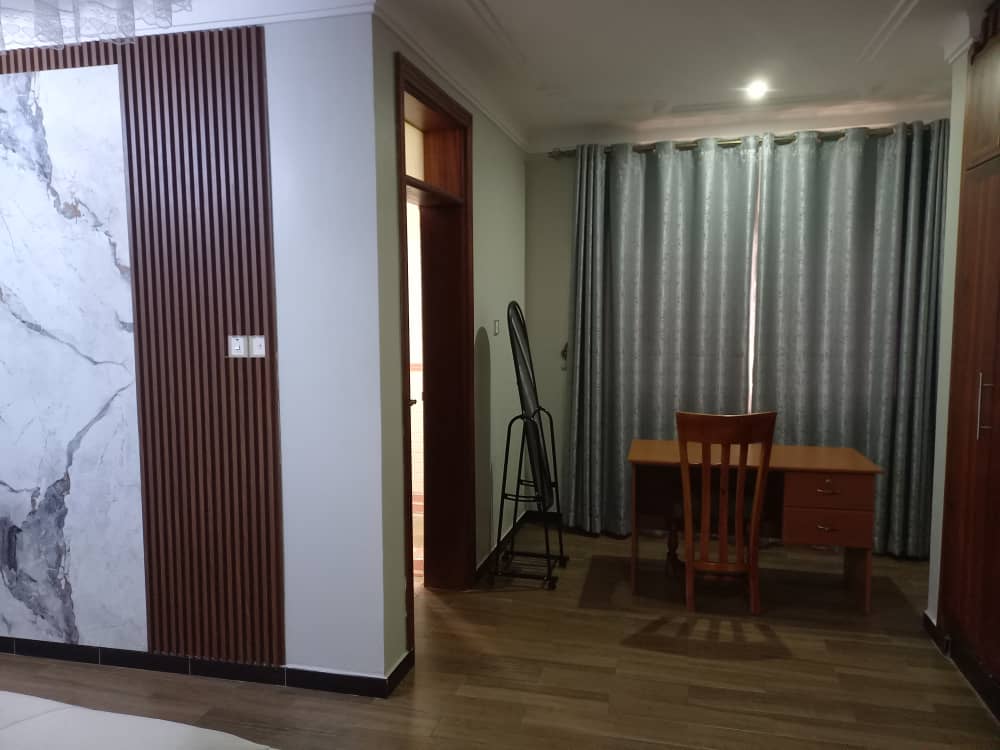
What Makes Good Family Airbnb Different from Standard Apartments
Booking accommodation for solo travelers or couples differs fundamentally from choosing spaces where families will actually live comfortably. The specific features that matter change completely when children enter the equation.
Space becomes non-negotiable. That cozy one-bedroom perfect for couples creates chaos for families. Children need room to spread toys, parents need space to escape when kids sleep, and everyone benefits from multiple areas reducing constant togetherness. Minimum two bedrooms work for small families, three bedrooms transform stays for larger groups or families with teens wanting privacy.
Outdoor access matters exponentially more with children. Compounds with gardens, small play areas, or even just patches of grass where kids can run provide pressure release after flights, between city tours, or when parents need quiet time. Many Makindye compounds include these spaces—verify specifically rather than assuming “garden” means anything substantial.
Kitchen functionality determines both budget and sanity. Restaurant meals every day with children becomes expensive and exhausting. The ability to prepare familiar breakfasts, simple lunches, and occasional dinners saves money while solving the universal parent problem of children who “don’t like anything” on restaurant menus. Full-size refrigerators let you stock snacks, drinks, and easy meals reducing constant food logistics.
Living room configuration impacts family harmony. Open-plan spaces work beautifully for couples but create problems when parents need adult conversation while children watch movies, or when jet-lagged kids crash early but parents want to remain awake. Separate living and sleeping areas preserve everyone’s sanity.
Laundry facilities save family trips. Children generate shocking amounts of dirty clothes—mud from adventure days, spills at meals, the mysterious ability to dirty outfits within hours of dressing. In-unit washing machines let you pack lighter and handle accidents without expensive hotel laundry services or desperate handwashing sessions.
Safety features require specific attention. Ground-floor apartments need window bars or security screens—Kampala’s opportunistic theft risk is real. Upper-floor apartments need secure railings on balconies if you have young children. Kitchens should have decent ventilation, electrical outlets should look properly installed, and hot water heaters should be professionally mounted, not jury-rigged.
Compound security matters differently for families than solo travelers. Beyond basic gates and guards, look for compounds where guards actively monitor, where other families live (indicating family-appropriate environment), and where outdoor areas are visible from apartments allowing supervision while children play.
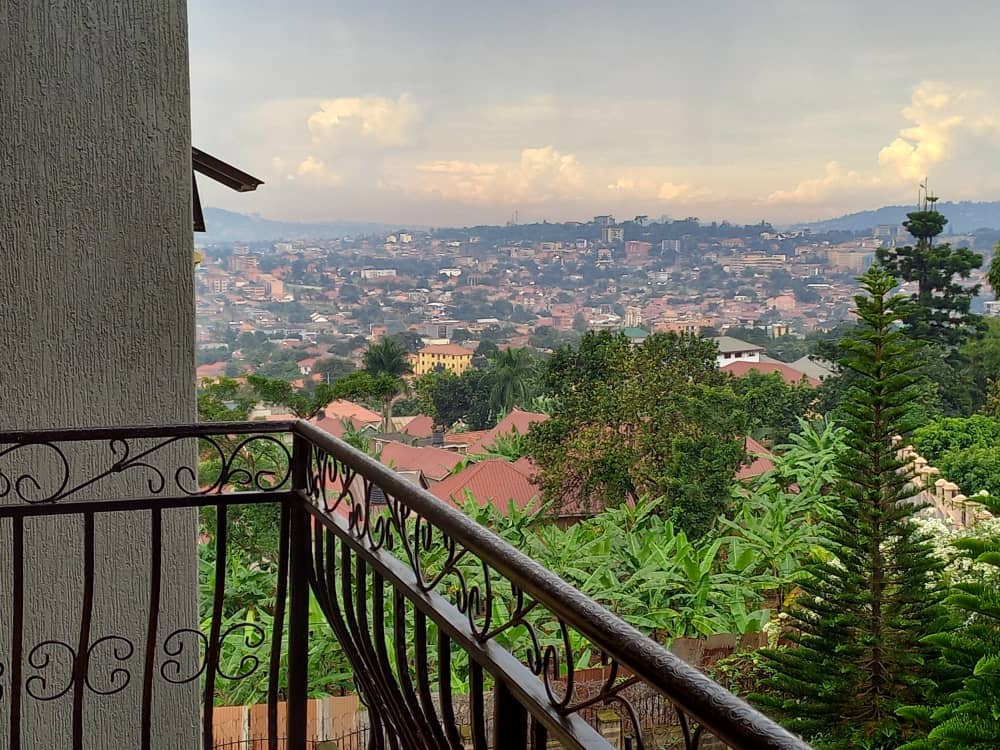
Practical Amenities That Make or Break Family Stays
The infrastructure details often overlooked in accommodation listings determine whether your family stay proves comfortable or frustrating. Kampala’s realities differ from Western countries, so specifically verifying certain features prevents unpleasant surprises.
Power backup systems aren’t luxury—they’re necessity with children. Kampala experiences power cuts, sometimes lasting hours. Properties with generator backup or inverter systems maintain lights, fans, refrigeration, and charging capability during outages. Without backup power, your evening routine collapses into darkness, food spoils in dead refrigerators, and devices die exactly when you need entertainment for restless children.
Ask specifically about generator capacity. Some systems only power lights and refrigerators, leaving air conditioning, water heaters, and full electrical function unsupported. For family comfort, particularly during Kampala’s hot season (January-March, June-August), generators capable of running climate control prove worthwhile despite higher costs.
Water reliability impacts daily functioning more than most visitors expect. Most Makindye compounds maintain large storage tanks (3,000-5,000+ liters) providing backup during municipal supply interruptions. Properties without adequate storage create hassles—no morning showers before touring, no kitchen water for cooking, no toilet flushing during supply gaps. Verify water backup exists and ask how often supply interruptions occur.
Water heaters should be electric (generator compatible) or solar with electric backup. Solar-only systems fail during cloudy periods exactly when you most want hot showers. Instant electric heaters work better than storage tank systems for families—multiple showers back-to-back don’t exhaust hot water supply.
Internet connectivity transformed from nice-to-have to essential for families. Children need entertainment during downtime—streaming movies, gaming, video calls with friends back home help manage homesickness and boredom. Parents need connectivity for booking onward travel, researching activities, and staying connected to work if combining vacation with remote work days.
Verify internet speed specifically. Basic browsing works at 5 Mbps, but streaming video needs 10+ Mbps, and multiple devices simultaneously require 20+ Mbps. Ask whether WiFi reaches all bedrooms or only common areas. Request the provider name—MTN and Airtel generally work well in Makindye, though performance varies by specific location.
Kitchen equipment deserves detailed attention. “Kitchen available” means vastly different things to different hosts. Verify: full-size refrigerator and freezer, stove with oven (not just hotplates), microwave, sufficient cookware and dishes for your family size, coffee maker or kettle, toaster, adequate counter space. Properties with barely functional kitchens force you back to restaurants defeating much of the purpose.
Sleeping arrangements require specifics beyond bedroom count. Are beds adequate size for adults? Do children’s rooms include actual beds or just floor mattresses? Are mattresses comfortable and clean? Is bedding sufficient quality and quantity? Families with very young children should ask about available cribs or whether they need portable sleeping solutions.
Climate control varies dramatically by property. Kampala sits near the equator—days often reach 28-32°C. Air conditioning dramatically improves comfort, particularly for children adjusting to tropical heat after arriving from temperate climates. At minimum, verify strong ceiling fans exist in bedrooms and living areas, and that windows actually open for cross-ventilation.
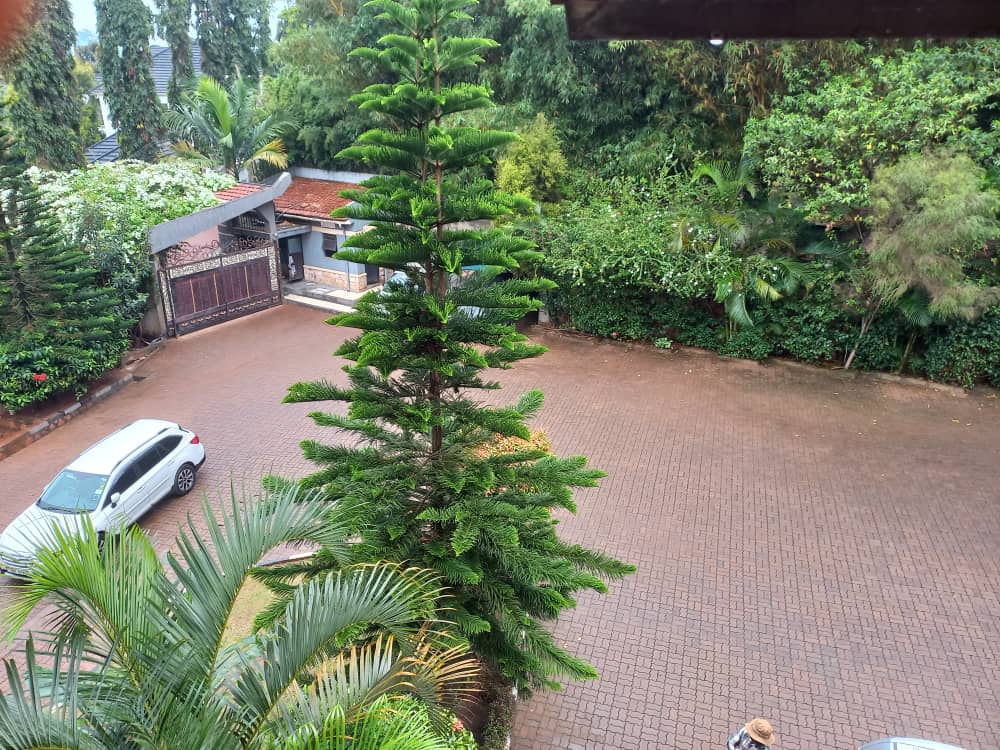
Safety and Security Considerations for Family Travelers
Kampala is generally safe for tourists and families, but sensible precautions and informed awareness make stays more comfortable and secure. The goal isn’t paranoia but practical awareness appropriate to urban East African context.
Compound security provides the foundation for family safety in Makindye. Gated properties with 24/7 security guards offer controlled access, package reception, and the visible security presence that deters opportunistic crime. Guards become familiar faces who greet your children, receive food deliveries, and provide the constant human monitoring that helps parents relax.
Ask hosts about specific security protocols: Do guards log visitors? Are there patrols overnight? How are deliveries handled? Is the compound wall secure (high enough, topped with barriers)? Are there security lights at night? These details separate serious security from theatrical appearance.
Window security matters particularly on ground floors. Properties should have window bars, security screens, or elevated position making access difficult. Break-ins in Kampala typically target easy-access ground-floor windows in properties with lax security. Upper-floor apartments (second or third floor) provide inherent security advantage.
Teach children age-appropriate awareness without frightening them. Don’t display expensive electronics conspicuously outside the compound. Don’t walk isolated paths after dark. Keep apartment doors locked even when you’re inside. These simple habits become second nature quickly without creating anxiety.
Neighborhood safety in residential Makindye rates well during daytime. Children can play in compounds under supervision, families can walk main roads to nearby shops, and the community presence creates natural monitoring. After dark, stick to main roads if walking, or use vehicles even for short distances. This isn’t because danger is high, but because poorly lit streets with limited pedestrian traffic create unnecessary risk.
Health safety involves different considerations. Ensure your accommodation has mosquito nets or screens—malaria risk exists throughout Kampala. Verify first-aid kit availability or pack your own. Keep anti-malarial medication accessible if prophylaxis is recommended for your family. Sunscreen, insect repellent, and basic medications should travel with you—pharmacies exist but finding specific children’s medications can be challenging.
Food and water safety requires attention. Most Makindye apartments include water filters or purification systems—verify this specifically. If not, buy bottled water for drinking and cooking. Wash fruits and vegetables with purified water. Cook eggs and meat thoroughly. These simple precautions prevent the stomach issues that ruin family vacations.
Medical access in Makindye is adequate. Life Trust Hospital sits in the area handling routine medical needs. Nsambya Hospital nearby provides excellent general care trusted by long-term residents. International Hospital Kampala (15 minutes away) handles serious emergencies. Keep travel insurance information accessible and know your accommodation’s address in local terms—guards can often direct you better than Google Maps during medical emergencies.
Getting Around Makindye with Children
Transportation logistics determine how smoothly your family explores Kampala from Makindye base. Understanding realistic options, costs, and challenges helps you plan appropriately.
Uber and Bolt operate reliably throughout Makindye, providing the safest, most predictable family transport. Pickup times usually run under 10 minutes during daytime. Costs are reasonable—15,000-25,000 UGX to city center attractions, 35,000-50,000 UGX to airport. Request larger vehicles (UberXL) for families with luggage or car seats. Driver quality varies but generally meets acceptable standards.
Not all vehicles include car seats. If traveling with small children requiring seats, either bring portable options or request specifically (success rates vary). Many families with older children forgo car seats accepting this reality of Ugandan transport, though this represents personal risk decision.
Boda-bodas (motorcycle taxis) provide cheap, fast transport but prove impractical for most families. Drivers don’t carry helmets for passengers (legally required but rarely enforced), riding with children creates safety concerns, and managing luggage or shopping becomes impossible. Solo parents occasionally use boda-bodas for quick errands leaving children with other family members at the apartment, but boda-bodas don’t work for family group transport.
Private taxi drivers offer more flexibility than ride-hailing apps. Many Makindye compounds have reliable drivers who residents recommend. These drivers often provide better child-friendliness—they’ll wait patiently during stops, help with doors and luggage, and get to know your family across multiple trips. Daily hire (full day with driver) costs 150,000-250,000 UGX depending on distance and negotiation—economical for full-day touring splitting costs across multiple destinations.
Ask your Airbnb host or compound security for driver recommendations. Establish pricing clearly upfront, get driver phone numbers for direct booking, and build relationships with reliable drivers for your stay duration.
Self-driving rental cars work for confident drivers comfortable with Kampala’s chaotic traffic, minimal lane discipline, aggressive matatus (minibuses), and creative interpretation of traffic rules. Rentals cost 100,000-200,000 UGX daily depending on vehicle type. Navigation relies on Google Maps which works adequately though street names often don’t match actual signage.
For families with young children needing car seats, rental companies can sometimes provide these—request specifically when booking. Parking at attractions usually exists but requires vigilance about vehicle security.
Walking works for immediate neighborhood errands but not for reaching attractions. Makindye’s main roads have minimal sidewalk infrastructure, drainage channels create trip hazards, and traffic moves aggressively close to pedestrians. Walking to nearby shops (10-15 minutes) proves manageable during daytime with older children. Longer walks or routes involving highway crossings become impractical and unsafe with young children.
Traffic timing dramatically affects transport planning. Morning rush (7:00-9:30am) clogs roads heading into city center—your outbound trip from Makindye flows relatively smoothly but returning against traffic proves slow. Evening rush (5:00-8:00pm) reverses this pattern. Midday travel (10am-4pm) moves most efficiently. Plan major touring during midday windows when possible.
Rainy season (March-May, October-November) complicates transport substantially. Flash flooding closes roads temporarily, traffic gridlock worsens, and journey times become unpredictable. Build extra time into all transport plans during these periods, and maintain flexibility when weather looks threatening.
Family-Friendly Activities Within Easy Reach of Makindye
Basing your family in Makindye positions you well for exploring Kampala’s attractions while providing easy access to natural escapes when city intensity overwhelms.
Lake Victoria shores at Ggaba (15 minutes) and Munyonyo (20 minutes) provide easy water access. Beaches vary from basic local spots to developed resort areas. Munyonyo Commonwealth Resort allows day passes (50,000-80,000 UGX per person) including pool and beach access—expensive but worthwhile for special days when children need pool time. Local Ggaba beaches offer more authentic experiences at minimal cost, though facilities are basic and you’ll need to manage vendor attention.
Boat trips from Ggaba or Munyonyo explore Lake Victoria, visit fishing villages, or cruise toward Ssese Islands. Negotiate prices—expect 200,000-400,000 UGX for 2-3 hour family trips depending on boat size and itinerary. Bring sun protection, snacks, and water as vendors don’t exist mid-lake.
Uganda Museum (25 minutes toward city center) provides accessible cultural education. Entry costs around 10,000 UGX for adults, less for children. The museum covers Ugandan history, traditional culture, and natural history through well-curated exhibits. Plan 2-3 hours. The gift shop sells quality crafts supporting local artisans. Nearby Nakasero Market offers cultural immersion and photo opportunities, though managing small children in crowded markets requires vigilance.
Ndere Cultural Centre (30 minutes to Ntinda) presents traditional Ugandan music and dance performances typically Friday and Sunday evenings. Shows run 90-120 minutes featuring energetic performances children enjoy even without understanding cultural context. Dinner packages available, though food quality rates average. Ticket prices around 50,000 UGX for adults, 25,000 UGX for children.
Craft markets scattered around Kampala offer shopping and cultural experience. Buganda Road craft market (20 minutes) remains the most organized—vendors sell wood carvings, baskets, jewelry, textiles, and typical tourist items. Prices require negotiation (expect to settle around 50-60% of initial asking price). Bring cash and patience—vendors persist but remain generally friendly.
Uganda Wildlife Education Centre in Entebbe (45-60 minutes) functions as combination zoo and conservation center. Entry around 30,000 UGX for adults, 15,000 UGX for children. Highlights include shoebill storks, chimpanzees, lions, and various antelope species. Facilities maintain decent standards, though nothing compared to Western zoos. Plan half-day visit combining with Entebbe Botanical Gardens (beautiful lakefront gardens with monkeys).
Shopping and errands occupy surprising amounts of family vacation time. Village Mall (15 minutes toward Bugolobi) provides centralized shopping—Carrefour supermarket, pharmacy, small shops, and Java House coffee. Acacia Mall (25 minutes in Kisementi) offers more upscale shopping, cinema showing current releases, better restaurant variety, and air-conditioned relief during hot days.
Playgrounds and parks remain Kampala’s weakness. Dedicated children’s play spaces barely exist. Some shopping malls include small play areas (Garden City has decent children’s zone). Hotel day passes sometimes include pool access—ask your host about options or search “swimming pool day pass Kampala.” Many families end up improvising entertainment through compound outdoor play, cultural experiences, and water-based activities.
Budget Planning for Family Airbnb Stays in Makindye
Understanding realistic costs helps families budget appropriately and avoid surprises that strain vacation finances.
Accommodation costs for family-sized Airbnb in Makindye typically range widely based on size, amenities, and season. Two-bedroom apartments run 150,000-350,000 UGX nightly, three-bedroom units 250,000-500,000 UGX nightly. Weekly and monthly rates often include significant discounts—don’t hesitate asking about longer stay pricing even for just one week.
Properties with generators, reliable internet, better furnishings, and managed by professional hosts command premium pricing but usually deliver better experience worth the additional cost. Budget options exist under 150,000 UGX nightly but often involve infrastructure frustrations, communication difficulties with hosts, or security compromises families shouldn’t accept.
Food costs depend dramatically on cooking versus restaurants. Grocery shopping for family meals runs roughly:
- Basic breakfast supplies (eggs, bread, coffee, fruit): 40,000-60,000 UGX for 3-4 days
- Lunch and dinner groceries: 100,000-150,000 UGX per day cooking most meals
- Snacks, drinks, treats: 30,000-50,000 UGX daily with children
Restaurant meals cost:
- Casual local restaurants: 15,000-25,000 UGX per person
- Mid-range restaurants: 30,000-50,000 UGX per person
- Hotel or upscale restaurants: 60,000-100,000+ UGX per person
Family of four eating all meals out spends 400,000-600,000 UGX daily. Cooking breakfasts and some dinners cuts this to 200,000-300,000 UGX daily—substantial savings over one-week stay.
Transport costs accumulate quickly:
- Uber/Bolt to city attractions: 15,000-25,000 UGX each way
- Airport transfers: 35,000-50,000 UGX each way
- Full-day driver hire: 150,000-250,000 UGX
- Fuel for rental car: 150,000-200,000 UGX per tank
Budget 100,000-200,000 UGX daily for family transport depending on ambition and distance of activities.
Activities and entertainment:
- Museum entries: 20,000-40,000 UGX family total
- Cultural performances: 100,000-200,000 UGX family total
- Zoo/wildlife center: 60,000-100,000 UGX family total
- Boat trips: 200,000-400,000 UGX per trip
- Resort day pass: 200,000-300,000 UGX family total
- Shopping/crafts: Variable but budget 100,000-300,000 UGX if buying
Miscellaneous costs:
- SIM card and data: 30,000-50,000 UGX for tourist stay
- Bottled water: 10,000-20,000 UGX daily
- Snacks and treats: 30,000-50,000 UGX daily
- Laundry detergent and supplies: 20,000-30,000 UGX
- Emergency pharmacy runs: 20,000-100,000 UGX depending on needs
Total daily budget for family of four staying in Makindye Airbnb:
- Budget approach (cook most meals, limited touring): 400,000-600,000 UGX daily
- Moderate approach (mix cooking and restaurants, regular activities): 700,000-1,000,000 UGX daily
- Comfortable approach (eat out frequently, multiple activities, nice accommodation): 1,200,000-1,800,000 UGX daily
These figures help realistic planning. Uganda remains relatively affordable compared to Western countries, but costs accumulate with families, particularly if trying to maintain familiar comfort standards.
Booking Smart: What to Look for in Makindye Listings
The specific Airbnb listing you choose determines your entire family experience. Beyond attractive photos and promising descriptions, certain details separate excellent properties from disappointing ones.
Reviews from families matter most. Look specifically for reviews mentioning children, discussing safety features, commenting on neighborhood appropriateness for families. Single travelers or couples evaluate properties completely differently than families managing children’s needs. Properties with multiple positive family reviews demonstrate track record beyond marketing claims.
Read negative reviews carefully—not just what they say but how hosts respond. Issues happen, but professional hosts address problems, show accountability, and demonstrate care about guest experience. Defensive, dismissive, or absent responses to criticism signal trouble ahead.
Photo authenticity requires scrutiny. Professional staging photos often misrepresent space size, furniture quality, and actual condition. Look for multiple photos of each room from different angles. Check for dated photos versus recent ones—furniture, paint, and conditions change. Photos showing only room corners or tight angles hide space limitations.
Specific visual verification checklist:
- Kitchen shows full appliance complement, not just artistic vignettes
- Bathrooms show complete fixtures, not just decorative details
- Bedrooms show actual bed sizes and room dimensions
- Living areas show real furniture layout demonstrating actual space
- Outdoor areas show full compound perspective, not just attractive corners
- Photos show electrical outlets, light fixtures, storage—practical details
Communication responsiveness predicts hosting quality. Message several questions before booking: generator capacity, internet speed, water backup, specific safety features, family-friendliness of compound. How quickly and thoroughly do hosts respond? Detailed, helpful responses suggest professional hosts who’ll support you during stay. Slow, vague, or dismissive communication foreshadows abandonment if problems arise.
Location specificity requires verification. “Makindye” encompasses large area with significant variation. Request specific street name or landmark. Check distance to main road, surrounding neighborhood character, and actual proximity to mentioned amenities. Some listings claim convenient locations but actually sit far from transport and facilities.
Drop the address into Google Maps (once host provides it). Check satellite view for actual compound appearance, surroundings, road access. Look at nearby amenities—how far actually to supermarkets, hospitals, restaurants hosts mention?
House rules reveal hosting philosophy. Extremely restrictive rules (no cooking certain foods, no shoes inside, complicated procedures) suggest inflexible hosts who’ll make family stays stressful. Reasonable rules about noise, guests, and basic respect indicate balanced approach. Complete absence of guidelines sometimes signals inexperienced hosts who haven’t thought through property management.
Pricing transparency includes understanding what’s included. Does nightly rate include electricity, water, internet? Some Kampala hosts charge separately for utilities, claiming variable costs—this creates unexpected bills and disputes. Clarify cancellation policies, cleaning fees, deposit requirements, and payment methods before booking.
Professional hosting indicators:
- Detailed, accurate listing descriptions
- Professional but authentic photos
- Quick communication
- Clear house manual or welcome guide
- Active problem-solving during stays
- Proper licensing (ask if they’re registered with tourism authorities)
Making Your Makindye Airbnb Feel Like Home
Arriving at short-term accommodation in foreign countries, especially with children, often feels overwhelming. Several steps help families settle quickly and establish comfortable routines.
Shop immediately upon arrival. Keep first day expectations minimal—jet lag and travel exhaustion hit families hard. But getting basic supplies sorted quickly helps everyone feel settled. Stock simple breakfast ingredients, snacks children recognize, bottled water, and coffee/tea for adults. That first morning waking up able to make familiar breakfast in your own kitchen dramatically improves morale.
Carrefour at Village Mall (15 minutes) provides one-stop shopping carrying both local and some imported familiar brands. Alternatively, combine shopping with cultural experience at local markets—Kibuye Market offers full grocery range at better prices though requires navigating vendors and chaos with tired children.
Establish routines quickly. Children thrive on predictability even during vacations. Set consistent meal times, bedtimes, and morning routines. Designate specific spaces—this is where we eat, this is where children play, this is quiet adult space after bedtime. Even in unfamiliar environments, routines create stability reducing stress for everyone.
Make the space yours temporarily. Unpack completely rather than living out of suitcases. Let children arrange toys and books in their space. Put family photos on tables using phone print apps or bringing small printed photos. These small acts transform rental spaces into temporary homes psychologically.
Meet the compound community. Introduce yourselves to security guards, neighboring families, and compound management. Guards become valuable resources—they’ll watch children playing outdoors, receive deliveries, provide security advice, and often help with questions about the area. Neighboring families sometimes share local knowledge, activity recommendations, and the social connection that enriches travel experiences.
Communicate with your host. Report any issues immediately—broken items, missing amenities, unclear instructions. Good hosts want to address problems quickly. Also share positive feedback—hosts often provide extra help or recommendations to families who communicate appreciatively.
Build backup plans. Power might cut, internet might fail, plans might change due to weather or unexpected circumstances. Keep entertainment backup—download movies before trips, pack books and games, maintain flexible daily plans. Uganda operates on “African time”—things happen eventually but rarely exactly as scheduled. Families who embrace flexibility rather than rigid scheduling enjoy stays more.
Explore your neighborhood. Walk nearby streets during daytime to find the small shops, restaurants, and local features that make Makindye interesting. Children benefit from this local immersion—buying snacks at small dukas (shops), greeting neighbors, seeing daily Ugandan life. These experiences often prove more memorable than formal tourist attractions.
Health and Safety Practical Tips
Beyond general security considerations, specific health and safety practices help families stay healthy and comfortable during Makindye stays.
Malaria prevention requires attention. Kampala has malaria risk year-round, though lower than rural areas. Consult travel medicine doctors about anti-malarial medication for your family weeks before travel—some medications require starting days or weeks prior to arrival.
In your accommodation, verify mosquito nets cover beds properly, check for holes or gaps. Close windows before dusk when mosquitoes become active, or ensure window screens exist and work properly. Use insect repellent on exposed skin during evenings. These simple measures significantly reduce mosquito exposure.
Water safety matters more than many families initially recognize. Don’t drink tap water even for brushing teeth initially—give family guts time to adjust. Use bottled or filtered water for drinking, cooking, and making ice. Wash fruits and vegetables with purified water. These precautions prevent the stomach issues that ruin vacations.
After several days many people drink filtered tap water without problems, but start conservatively with children’s systems. Most Makindye apartments include water filters—verify they’re functioning and cartridges are reasonably new.
Sun protection deserves serious attention near the equator. Kampala’s latitude means intense sun year-round. Children burn quickly despite cloudy days. Apply high-SPF sunscreen liberally and repeatedly, especially during water activities. Hats and protective clothing help during extended outdoor time. Dehydration happens faster than families from temperate climates expect—push water intake constantly.
Food safety requires basic awareness without paranoia. Eat at busy restaurants where food turns over quickly. Avoid street food initially until family stomachs adjust—later in trips, experimentation proves safer. Ensure meat and eggs cook thoroughly. Peel fruits yourself rather than eating pre-cut fruit. These simple rules prevent most food-related illness.
When cooking in your apartment, wash produce well, maintain refrigerator temperatures properly, and handle raw meat carefully. Power cuts potentially compromise refrigeration—if extended outages occur, assess whether refrigerated foods remain safe.
First aid preparation should happen before arrival. Pack family-appropriate supplies: pain relievers/fever reducers (both adult and children’s formulations), antihistamines for allergic reactions, anti-diarrheal medication, bandages and antiseptic, any prescription medications family members need, oral rehydration salts for treating dehydration. Pharmacies exist in Makindye but finding specific children’s medications under stress proves harder than bringing supplies.
Emergency numbers should stay easily accessible:
- Police: 999 or 112
- Ambulance: 911 or 112
- Your accommodation address written in clear terms
- Host contact number
- Travel insurance emergency number
- Embassy contact (if applicable)
Brief older children on emergency procedures—how to communicate address, how to reach you if separated, where to find trusted adults like security guards.
Seasonal Considerations for Planning Your Stay
Uganda’s equatorial location means consistent temperatures year-round, but rainy seasons significantly impact family travel experiences in Makindye.
Dry seasons (December-February, June-September) provide easiest family travel. Roads remain passable, outdoor activities work reliably, and logistics prove simpler. December-January is hottest period (often exceeding 30°C daily)—air conditioning becomes more important for family comfort. June-July brings cooler temperatures (24-28°C) with less humidity—often considered optimal weather.
These peak seasons also mean higher accommodation prices and more advance booking required. Popular attractions see more visitors, though Kampala never truly feels overcrowded.
Rainy seasons (March-May, October-November) bring challenges but also opportunities. March-May delivers heavier, more consistent rain—expect afternoon downpours most days,
though mornings often start clear. October-November brings shorter, less predictable showers scattered throughout days.
Rain itself isn’t necessarily problematic—it’s the secondary effects. Flash flooding closes roads temporarily, creating traffic chaos. Compound grounds become muddy, limiting outdoor play. Planned outdoor activities get postponed. Power cuts increase during storms. Laundry takes forever to dry without dryers.
However, rainy season accommodation prices drop 20-30%, availability improves dramatically, and Uganda’s landscapes explode into lush green beauty. Families with flexible schedules and tolerance for weather-related plan changes can find excellent value. Just build contingency plans—indoor activities, backup entertainment, extra buffer time for all transport.
Holiday periods affect both pricing and local atmosphere. Ugandan school holidays (April, August, December) mean more local families traveling, potentially affecting availability. International holidays (Christmas, Easter, summer months) bring expat visitors and higher prices. Book well ahead for these periods.
Cultural events occasionally coincide with your stay. Kampala City Festival (October), Nyege Nyege Festival (September), and various cultural celebrations add color to visits but also create accommodation demand spikes and traffic complications. Check event calendars when planning—you might want to experience these or deliberately avoid crowds depending on family preferences.
When Extended Stays Make More Sense Than Hotels
Many families arrive planning short Kampala stops, then discover that longer Makindye stays serve their East African adventures better than originally conceived.
Gorilla trekking families often structure trips around Uganda’s main attraction without considering Kampala fully. The typical pattern: fly into Entebbe, rush to Bwindi or Mgahinga for permits, rush back for departure flights. This exhausting approach misses opportunities while stressing families unnecessarily.
Smarter structure: Arrive Kampala, spend 2-3 days adjusting to time zones and recovering from international flights in comfortable Makindye apartment. Children adapt to new environment gradually. Parents research and confirm onward logistics without jet-lag confusion. Then proceed to gorilla trekking rested and oriented.
Return to Kampala for 2-3 days post-trekking for the same reasons—gorilla experiences are intense physically and emotionally, particularly for children. Having familiar base to decompress, process experiences, and prepare for international return flights makes the entire adventure more sustainable.
Safari combinations work similarly. Families rushing through Queen Elizabeth, Murchison Falls, or Kidepo safaris without buffer time arrive home exhausted. Strategic Kampala bookends let families transition gradually between home and adventure, normal routines and intense experiences.
Medical tourism families visiting Uganda for treatments at Kampala’s excellent private hospitals benefit enormously from apartment-style accommodation. Recovery happens better in home-like environments than sterile hotels. Family members accompanying patients need their own space and cooking capability for extended stays. Several-week medical visits become manageable financially and psychologically in furnished apartments impossible to sustain in hotels.
Visiting expatriate family or friends often means you want nearby accommodation, not imposition on their homes. Booking Makindye apartments near relatives working in Uganda provides proximity while maintaining everyone’s space and independence. Daily visits work beautifully, but everyone sleeps in their own beds.
“Test run” relocations bring families considering longer-term Uganda moves. Rather than committing immediately to long-term leases, smart families book month-long Makindye stays exploring neighborhoods, schools, lifestyle before making bigger commitments. This try-before-you-buy approach prevents expensive mistakes and helps families understand whether Uganda suits them.
The breakeven point where apartments make more financial sense than hotels arrives around 5-7 days depending on specific pricing. Beyond that, every additional day delivers better value. But the psychological and practical benefits—space, cooking, routines, authentic neighborhood living—justify apartments even for shorter stays for many families.
Why Palatine Apartments Understands Family Needs in Makindye
We’ve watched hundreds of families navigate Kampala visits from our Makindye base. We’ve seen what works, what causes stress, and what transforms good trips into exceptional experiences. This accumulated wisdom shapes how we approach family accommodation differently than generic Airbnb hosts.
Our furnished apartments in Makindye specifically accommodate family realities. We maintain properties with multiple bedrooms that actually fit families comfortably, not couples squeezed into inadequate space. Our kitchens come genuinely equipped—full appliances, adequate cookware, sufficient dishes—because we understand cooking isn’t optional luxury but essential family need. We ensure reliable generator backup, water storage, and internet connectivity because we know infrastructure failures ruin family stays.
Security receives serious attention in our properties. We select compounds with professional security, proper lighting, and the family-friendly atmosphere where children can play safely under supervision. We verify window security, check playground equipment, and ensure outdoor areas suit family use. These details matter enormously but often get overlooked by hosts focused on aesthetics over functionality.
We provide honest, detailed information before booking. We’ll tell you which properties work best for different family sizes and ages. We’ll explain neighborhood characteristics candidly, recommend specific locations based on your plans, and discuss realistic expectations about Kampala life. This transparency helps families choose appropriately rather than discover mismatches after arrival.
During your stay, we remain accessible and responsive. Power cuts at 9pm with crying children? We help troubleshoot or arrange solutions quickly. Questions about where to find specific items, which restaurants accommodate families, how to navigate particular challenges? We provide practical, tested advice from experience, not generic Google results.
We offer flexible booking terms understanding family plans change. Medical situations, weather disruptions, travel complications, work schedule shifts—life happens, especially during international trips. We work with families to adapt bookings reasonably rather than enforcing rigid policies that penalize circumstances beyond your control.
Our pricing remains transparent and competitive. What we quote includes what you’ll actually pay—no surprise utility bills, no hidden cleaning fees multiplied mysteriously, no deposit disputes over normal wear. We believe family travel carries enough complexity without accommodation providers adding financial stress.
Making Your Makindye Family Stay Memorable
The best family trips balance structure and spontaneity, tourist experiences and authentic daily life, activity and rest. Makindye accommodation provides the stable base letting you create this balance rather than forcing constant motion that exhausts everyone.
Some of our families’ favorite Kampala memories happen not at major attractions but in quiet Makindye moments: early morning walks to the local market with children negotiating fruit purchases in broken English and Luganda, compound evenings where your kids befriend neighbor children creating impromptu soccer matches, cooking family dinners with Ugandan ingredients creating fusion disasters everyone laughs about later, afternoon rain showers watched from your balcony while playing cards.
These ordinary moments become extraordinary because they’re authentic, pressure-free, and uniquely yours. Hotel rooms don’t create space for this kind of organic family experience. Makindye apartments do.
Whether you’re spending three days or three weeks, arriving exhausted from international flights or energized from gorilla encounters, traveling with babies or teenagers, your Makindye accommodation should support your family’s specific needs rather than forcing adaptation to generic hospitality formulas.
At Palatine Apartments Uganda, we’ve built our Makindye properties and hosting approach around this understanding. We know families need space, functionality, safety, and support more than luxury amenities or Instagram aesthetics. We provide the former seriously while keeping costs reasonable, because we believe excellent family accommodation shouldn’t require premium budgets—just hosts who actually understand what families need.
If you’re planning your Kampala family adventure and want accommodation that truly works for children, parents, and your specific situation, we’d love to discuss your needs and recommend the best Makindye options for your dates and requirements. Reach out with your questions, concerns, or specific circumstances. We’re here to help make your Uganda family experience as smooth, comfortable, and memorable as possible—starting with finding you the right home base in Makindye where your adventure can unfold naturally.

